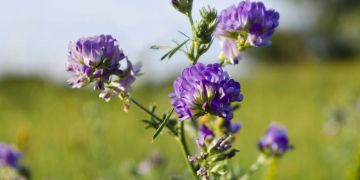History
Alfalfa is a name everyone has heard, but few know much about it other than the fact that it's a plant. The alfalfa plant is primarily native to Asia, and is considered to be one of the first known herbs to mankind. It is a member of the Pea family Fabaceae and it is often used for feeding animals as it has the highest nutritional value of all the hay/forage crops. The word alfalfa is derived from Arabic, specifically the phrase al-fac-facah, which literally means "Father of all foods" because it is so rich in essential nutrients. Clearly, ancient ancestors considered alfalfa to be vital to their everyday lives. They used it not just for their own consumption, but to feed their livestock and to better fertilize their agricultural lands due to its abundance of vitamins and minerals. Although it originated in Asia, it is now extremely common in the USA, Europe, Canada.
Health Benefits
Vitamins
So what makes this plant so extraordinary? What about it is so powerful and beneficial, not only to the human body, but to agriculture and other animals alike? When something is naturally derived and an evolved product of the Earth, the benefits that arise from using it are abundant. The alfalfa plant is naturally high in many essential vitamins, including A, D, E, K, and even the full family of B vitamins. Each individual vitamin has an abundance of health benefits in itself, making them crucial to overall human health. It is surprising for so many different types of vitamins to be present in just one plant, which makes the lure of consuming this plant all the greater.
Minerals
Not only does the alfalfa plant contain a full spectrum of important vitamins, but it is also loaded with extremely important minerals such as biotin, calcium, folic acid, iron, magnesium, potassium, and many others. As if there needed to be another reason as to why it's so great, the alfalfa plant is also super high in protein, especially when dried. The alfalfa plant has an unusual, extensive root system that can reach as far as 60 feet into the soil. This is what allows the plant to absorb more vitamins and minerals than the average plant, further giving credentials to its title as, "The king of all foods."
Diuretic
The alfalfa plant, along with many other ancient herbs, has a list of health benefits that are nearly endless. It has been found that regularly ingesting alfalfa can aid in flushing the bowels of built up toxins. In addition, the alfalfa herb has been used widely for diuretic purposes. This is especially common among people who had been experiencing things like heavy water retention or urinary tract infections. Using a natural herb as a laxative or diuretic is much more beneficial than using an over the counter remedy, because there aren't any added man made chemicals or compounds that could further irritate the situation.
Lowers cholesterol
The alfalfa herb is believed to have a direct connection to lowering cholesterol, which is once again in direct connection with all of the positive vitamins and minerals it contains. The alfalfa herb is very good at detoxifying and better purifying the blood. As a result, regular consumption of alfalfa can lower blood pressure and balance hormones.
Additional benefits
The alfalfa plant has beneficial healing properties against bad breath, sore or achy joints, imbalanced skin conditions, and it even increases immune system functionality. When consumed regularly, it acts as an alternative to over the counter pain medicines for headaches or migraines because of its high calcium and magnesium levels. As anyone can see, consuming alfalfa herb on a routine basis has an abundance of positive health results.
How To Take
Getting alfalfa into one's diet is not at all complicated. It can be taken in many different forms. A popular way to get this herb into the system would be to drink brewed tea daily. For added benefits and a better taste, a helpful suggestion would be to brew alfalfa tea with another flavored tea, as while the health benefits of this herb are extremely apparent, the taste can be slightly bland. This herb can also be taken in capsule form, in much the same way a person might consume their daily mutli vitamin. This is a great way of gaining all the health benefits every day. Dried Alfalfa is as good, if not better, than fresh Alfalfa so capsules are a great way to take it. Alfalfa can also be mixed in with different foods. Salads, soups, casseroles, or whatever one's heart desires can be made astronomically more healthy without hardly any change in taste. The alfalfa herb is very mild in flavor and because of this, it can be used in many different ways.





